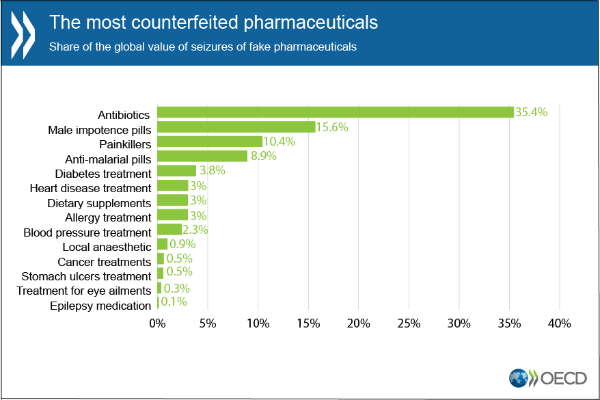Covid-19 Crisis Underscores Need To Address Trade In Fake Pharmaceuticals, Say OECD & EUIPO
Recent seizures of fake medical supplies being marketed as protection against Covid-19 underscore the need to address a growing international trade in counterfeit pharmaceuticals that is costing billions of euros a year and putting lives at risk, according to the OECD and the EU’s Intellectual Property Office.
A joint report, Trade in Counterfeit Pharmaceutical Products, and an accompanying brief on links with the Covid-19 crisis, says the trafficking and sale of fake or defective medicines is enriching criminal groups and endangering health while draining away vital industry and tax revenues. Analysis of customs seizures over 2014-16 finds that trade in counterfeit pharmaceuticals was worth EUR 4 billion in 2016. That figure excludes fake medicines produced and consumed domestically and shipments of pharmaceuticals that are stolen in transit and rerouted for sale in a different market or country.
“The sale of counterfeit and defective pharmaceuticals is a despicable crime, and the discovery of fake medical supplies related to Covid-19 just as the world pulls together to fight this pandemic makes this global challenge all the more acute and urgent,” said OECD Secretary-General Angel Gurría. “We hope the evidence we have gathered on the value, scope and trends of this illicit trade will help lead to rapid solutions to combat this scourge.”
Interpol recently reported a rise in fake medical products related to Covid-19. Seizures of fake Covid-19 tests, facemasks and hand sanitizers have been reported by customs authorities such as the US Customs and Border Protection, and the World Customs Organisation.

The OECD-EUIPO report finds that most of the counterfeit drugs seized over 2014-16 were fake antibiotics, male impotence pills, painkillers and medication for malaria, diabetes, epilepsy, heart disease, HIV/AIDS, cancers, high blood pressure and allergies. The vast majority contain incorrect proportions of active ingredients, meaning they are unlikely to work. Many contain undeclared substances that can pose serious health risks. Forensic tests of suspect samples show that in 90% of cases, counterfeit medicines can harm patients.
Strong global demand, high profit margins and a low risk of detection make pharmaceuticals especially vulnerable to counterfeiting. Criminal groups may traffic medicines made with substandard ingredients or steal legitimate pharmaceuticals destined for hospitals to sell on the street at cut prices, often storing them in poor conditions that reduce their effectiveness.
The volume of fake or defective pharmaceuticals in circulation has ballooned with the rise of rogue online pharmacies – 96% of websites offering pharmaceuticals are operating illegally – and with the surge in the use of postal services, where inadequate labelling makes detection and interception difficult.
More than half the fake medicines seized in recent years originated in India and nearly a third came from China with the main destinations being Africa, Europe and the United States. Singapore and Hong Kong are key transit points in the supply chain, with other routes running through the United Arab Emirates, Egypt, Cameroon and Turkey. Pharmaceutical companies from the US, EU and Switzerland are the hardest hit by counterfeiting.
The OECD has been working with governments for several years to address gaps in regulation and poor law enforcement that enable counterfeit trade to flourish.
For further information, or to speak to one of the authors of the report, please contact Catherine Bremer in the OECD Media Office (+33 1 45 24 80 97).
Download the report: Trade in Counterfeit Pharmaceutical Products
Working with over 100 countries, the OECD is a global policy forum that promotes policies to improve the economic and social well-being of people around the world.


 Commonwealth Foundation: Commonwealth Short Story Prize 2025 Regional Winners Announced
Commonwealth Foundation: Commonwealth Short Story Prize 2025 Regional Winners Announced New Zealand Defence Force: NZDF Joins Large South Pacific Disaster Exercise As New Response Group Starts Work
New Zealand Defence Force: NZDF Joins Large South Pacific Disaster Exercise As New Response Group Starts Work UN News: UN Warns Copper Shortage Risks Slowing Global Energy And Technology Shift
UN News: UN Warns Copper Shortage Risks Slowing Global Energy And Technology Shift Peace Action Wellington: Mahia - Now A US Nuclear Base?
Peace Action Wellington: Mahia - Now A US Nuclear Base? UN Special Procedures - Human Rights: Mali - UN Experts Say Mali Should Not Hinder Or Suspend The Activities Of Political Parties
UN Special Procedures - Human Rights: Mali - UN Experts Say Mali Should Not Hinder Or Suspend The Activities Of Political Parties ICHRP: Zero In - Killings Heighten In Northern And Southern Philippines Amidst 2025 Midterm Elections
ICHRP: Zero In - Killings Heighten In Northern And Southern Philippines Amidst 2025 Midterm Elections